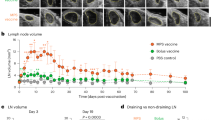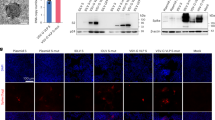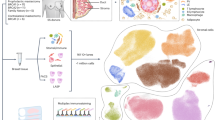Abstract
Herpes simplex virus type 2 (HSV2) was first associated with human cervical cancer by seroepidemiologic studies over 10 years ago, but there has been no clearcut evidence confirming or refuting the role of the virus in this cancer. Expression of HSV antigens in cells transformed in vitro by the virus has been reported by several groups1,2. Evidence for the association of HSV antigens with human cervical cancer has recently been reviewed3–5; general antisera prepared against HSV virions or structural proteins were used by several groups to screen cells derived from the cancer and equivocal results were obtained. The tumour-specific antigens associated with three known oncogenic DNA viruses—adenovirus type 2, SV40, and Epstein–Barr herpesvirus—are DNA-binding proteins5–8. Therefore, proteins which bind DNA were isolated9,10 from HEp-2 cells infected by HSV2, and monospecific antisera to two of these proteins (ICSP11/12 and ICSP 34/35) were prepared. These rabbit antisera react specifically with the nuclei of HSV2-infected cells11. We show here that an HSV2-specific DNA-binding antigen was expressed in 38% of tissues with pathological findings of severe dysplasia or carcinoma. This therefore constitutes further evidence for HSV2 as a factor in human cervical carcinoma.
This is a preview of subscription content, access via your institution
Access options
Subscribe to this journal
Receive 51 print issues and online access
$199.00 per year
only $3.90 per issue
Buy this article
- Purchase on Springer Link
- Instant access to full article PDF
Prices may be subject to local taxes which are calculated during checkout
Similar content being viewed by others
References
Rapp, F. & Reed, C. Cancer Res. 36, 800–806 (1976).
Flannery, V. L., Courtney, R. J. & Schaffer, P. A. J. Virol. 21, 284–291 (1977).
Nahmias, A. J. & Sawanabori, S. Prog. exp. Tumor Res. 21, 117–139 (1978).
Melnick, J. L. & Adam, E. Prog. exp. Tumor Res. 21, 49–69 (1978).
Thomas, D. B. & Rawls, W. E. Cancer 42, 2716–2724 (1978).
Ravska, K. Jr., Rubio, V. & Biron, K. R. FEBS Lett. 62, 173–176 (1975).
Carroll, R. B., Hager, L. & Dulbecco, R. Proc. natn. Acad. Sci. U.S.A. 71, 3754–3757 (1974).
Luka, J., Lindahl, T. & Klein, G. J. Virol. 27, 604–611 (1978).
Powell, K. L. & Purifoy, D. J. M. Intervirology 7, 225–239 (1976).
Purifoy, D. J. M. & Powell, K. L. J. Virol. 19, 717–731 (1976).
Powell, K. L. & Purifoy, D. J. M. J. Virol.(submitted).
Cabral, G. A., Gyorkey, F., Gyorkey, P., Melnick, J. L. & Dreesman, G. R. Expl molec. Pathol. 29, 156–169 (1978).
Jones, K. W., Fenoglio, C. M., Shevchuk-Chaban, M., Maitland, N. J. & McDougall, J. K. in Oncogenesis and Herpesviruses III Part 2, 917–925 (International Agency for Research on Cancer, Lyon, 1978).
Author information
Authors and Affiliations
Rights and permissions
About this article
Cite this article
Dreesman, G., Burek, J., Adam, E. et al. Expression of herpesvirus-induced antigens in human cervical cancer. Nature 283, 591–593 (1980). https://doi.org/10.1038/283591a0
Received:
Accepted:
Issue Date:
DOI: https://doi.org/10.1038/283591a0
This article is cited by
-
Distribution of epithelial antigens in the human unterine cervix: A review
Archives of Gynecology and Obstetrics (1989)
-
Expression of the HSV specified major DNA-binding protein in virus infected RAJI and VERO cells
Archives of Virology (1987)
-
HSV infected RAJI-cells specify HSV specific immediate early and/or early DNA-binding proteins
Archives of Virology (1986)
Comments
By submitting a comment you agree to abide by our Terms and Community Guidelines. If you find something abusive or that does not comply with our terms or guidelines please flag it as inappropriate.



